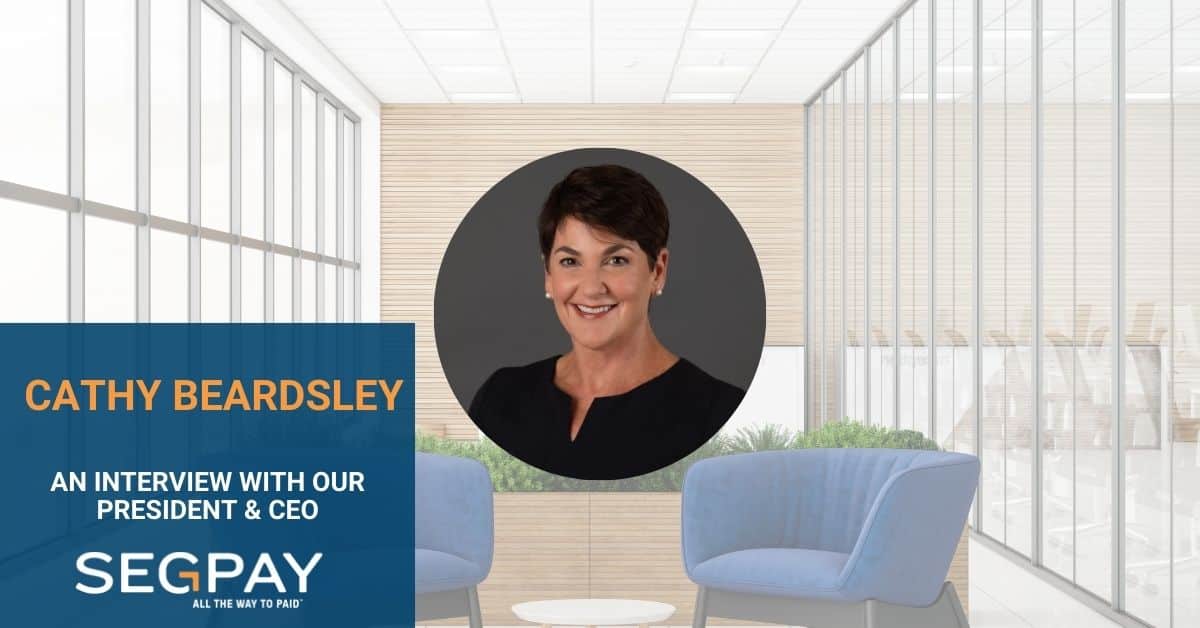In the USA, Cathy Beardsley does not need an introduction. American Banker nominated her as one of the Most Influential Women in Payments this year. Cathy founded Segpay back in 2005. Almost two decades later, Segpay has a robust international presence. Based in South Florida, the payment company has expanded its footprint with headquarters in Ireland (EU) and England (UK). Segpay is one of a few companies approved by Visa to process high-risk payments securely and offers a growing variety of payment services to over 600 global merchants. Segpay increased its payment facilitator volume by 17% over the last six months of 2023.
Hi Cathy, thank you for your time! Over the past years, your company has grown its global presence with Segpay headquarters in the USA, Ireland, and the UK. Could you share some of your European success stories and the challenges you overcame as an American PSP entering the European payment market?
CB: The main challenge we had setting up in the UK and Ireland as a Payment Institution was hiring the staff to move us through the application process and then building out the team to support the infrastructure to meet the Central Bank of Ireland’s UK Financial Conduct Authorities requirements. It was important for us to collaborate with staffing organizations and legal help in both jurisdictions to find the right team members to support both the Irish and UK subsidiaries. I am happy to say that we have well-rounded teams in Ireland and the UK that work closely with our team in the US. The subsidiary teams are invited to work with the US team every year, and US team members visit the subsidiary offices once or twice a year. We try hard to make sure that we have a global culture that puts compliance and client care as our top priorities. We have consistently grown our EU and UK client base and processing volume through the subsidiaries.
Q: Segpay is known for the secure, compliant, and customer-friendly ways in which you manage medium- and high-risk payments. Subscription models are also considered high-risk. What value-added services do you provide to merchants whose business model depends on secure recurring billing, and how do you help these clients minimize chargeback risk?
CB: Segpay specializes in subscription billing. Clear and concise disclosures, letting consumers know the terms of their membership on the payment page, are crucial. We provide details on how to reach our call center or online portal for consumers to cancel every single receipt. We also require merchants to have this information on their website, which is included on our payment page at checkout. For memberships that are 90 days or longer memberships, we send out a reminder email before the consumer is billed. We actively review card brand fraud alerts, and Segpay uses tools such as Visa’s RDR program, Verifi, and Ethoca to detect potential consumer complaints to the card schemes, which enables us to cancel or refund transactions before they turn into chargebacks.
Q: In March 2023, Segpay announced its partnership with the Internet Watch Foundation. Established in 1996, the IWF is a non-profit organization dedicated to combatting the distribution of child sexual abuse content online. Could you explain the importance of the IWF and the ways in which your partnership has helped the IWF to make the Internet safer for kids?
CB: We became members of the Internet Watch Foundation back in 2022. Our membership to the IWF helps provide the organization with resources to scour the Internet and look for CSAM (Child Sexual Abuse Material), which is removed at once and reported to authorities. The IWF also provides Segpay with tools to ensure we only offer our payment services to compliant merchants.
Q: Lawmakers worldwide are implementing regulations to protect minors when they surf the Internet. Age Verification has become key to making sure that minors do not get access to specific products or services, such as age-restricted online gaming, streaming, dating, or adult content that could be harmful to kids. Technology has proven to be a great ally. The main challenge seems to be to balance data privacy concerns with the protection of minors. What are your thoughts on this complex subject?
CB: I am 100% in support of creating a safe environment for minors as they surf the Internet. Unfortunately, some laws require consumers to upload their driver’s license and passport. Most consumers have privacy concerns and hesitate to upload personal documentation to sites they are unfamiliar with. There is a fear of what will be done with this information and whether the site is secure. Therefore, merchants prefer to use Yoti, Verifymy, or other third-party solutions to manage age verification. Once the customer is age verified, this verification can be used for any website that uses their services.
Q: There seem to be different approaches to Age Verification, both from an ethical (privacy) and a technological perspective. For example, there is a user-based age verification as opposed to device-based age verification. Please explain.
CB: The number one concern consumers have when being prompted for age verification is the requirement to upload personal information to websites that they are not familiar with. A better way to address age verification is through transactional data or through settings on consumers’ mobile devices. Transactional data such as cell phone numbers, abbreviated passport numbers, SSNs, or national identification card information can provide the correct age for the consumer. This would eliminate the need for consumers to upload sensitive personal information to websites. Another possibility is to work with mobile providers who can set up settings on the consumer’s account for each device that identifies the age of the individual using the device. This would be another way to confirm the user without requiring personal information.
Q: As the CEO and founder of a successful international payment services provider, you have been a board member and CFO of the Free Speech Coalition (FSC) for years now. Please tell us about banking discrimination and the role of the FSC.
CB: I have been on the Board of the FSC for close to 8 years. We have been highly focused on banking discrimination for merchants and content creators. If people are running legal businesses, they should be entitled to banking services. Unfortunately, for many in the adult industry, banks will not necessarily open bank accounts for merchants or content creators as they are uncomfortable with the business or have other concerns. The FSC has been actively working with US Senate and Congressional offices to make them aware of this. I was able to take part in one of the many trips to speak about banking discrimination with lawmakers. Our experience is that once this concern is shared with Congressional and Senate offices (regardless of political party affiliation), they all agree that banking for legal businesses is a human right. We are hopeful that legislation will be passed protecting those suffering from banking discrimination. In addition, the FSC is working on setting up a credit union that would support those who are having trouble receiving financial services (banking, loans, credit cards) from traditional banks. We are in the application stage for our charter but hope to make this a reality by 2026.
Thank you so much, Cathy, and congratulations on your American Banker Nomination as one of this year’s Most Influential Women in Payments!
Segpay’s Founder and CEO Cathy Beardsley was interviewed by @SandeCopywriter



